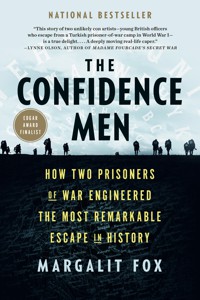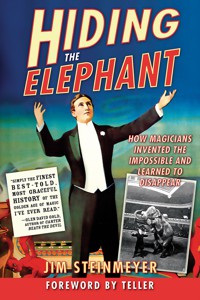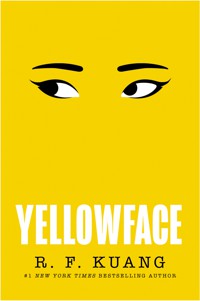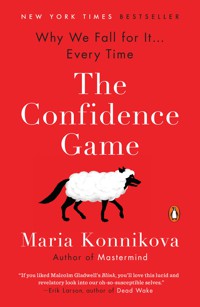Each of these titles will stick with you and, perhaps, make you more likely to realize when you’re not seeing the truth.
Our brains are wired to be deceived. I’m married to a professional magician, so I’m intimately familiar with the kinds of techniques that can fool the eye and trick the senses. But the human mind’s vulnerability to misdirection is more universal than that. Neurologists and psychologists have found that our predilection for trusting others—a trait that has helped us survive as a species—is a major reason con artists thrive. This trait also makes dissimulation fascinating and appealing, especially in literature. Readers love the stories of swindlers and their gullible targets, of grifters themselves being tricked, and every iteration in between. They thrill us by upending the expected and making us question our assumptions.
The six books below all delve into deception. Some tell tales of elaborate confidence schemes; others interrogate why people are frequently defenseless against cons that, from the outside, seem obvious. Several books also dig into how we’re liable to deceive ourselves, often to our detriment. Each is a fascinating read that will stick with you and, perhaps, make you a bit more likely to realize when you’re not seeing the truth.

The Confidence Men: How Two Prisoners of War Engineered the Most Remarkable Escape in History, by Margalit Fox
Outside of magic, there are few examples of someone undergoing a con for non-nefarious reasons. The true story that Fox recounts in The Confidence Men, however, is one of them. In World War I, two prisoners of war held in a camp in Turkey convinced their captors—and some of their fellow prisoners—that they could use a Ouija board to talk with spirits. Those spirits just happened to know where a lost treasure was buried, and the two men developed an arduous plan that cajoled their jailers into letting them leave the camp to find it. The escape was far from straightforward—as Fox describes, the two had to “feign mental illness, stage a double suicide attempt that came perilously close to turning real, and endure six months in a Turkish insane asylum, an ordeal that drove them to the edge of actual madness.” But the confidence game ultimately led to their freedom, and Fox combines the machinations of their escape with a present-day understanding not only of how people are predisposed to getting duped, but also of how they often refuse to change their beliefs, even when it’s clear that those beliefs are provably false.

Hiding the Elephant: How Magicians Invented the Impossible and Learned to Disappear, by Jim Steinmeyer
Early on in Hiding the Elephant, Steinmeyer states that “magicians guard an empty safe.” The methods that prestidigitators use to fool their audiences are not secrets kept in a locked box, available to only the initiated. Indeed, these days, anyone can suss out with a simple Google search how tricks are done. But the tricks aren’t what makes magic endure. According to Steinmeyer, great magicians create a “temporary fantasy” where, “with a gesture, a suggestion, a feint or contrivance, the audience is convinced that they are watching a genuine wonder.” Based on this premise, Steinmeyer—who has designed illusions for performers such as Doug Henning, Ricky Jay, and Siegfried & Roy—reveals the methods behind how magicians throughout history accomplished certain acts. (The title, for example, references the legendary escape artist Harry Houdini, who famously made an elephant disappear in 1918.) But arguably more fascinating than the methods Steinmeyer reveals are his profiles of magicians. He makes a strong case that Houdini, formerly known as Erik Weisz, was in fact a “terrible magician,” and vividly describes the personalities from the late 19th and early 20th centuries who were behind some of magic’s greatest innovations. It’s a dynamic, entertaining read, painting a rich history of magic’s golden age while delving into what drove these artists, and why audiences loved them for it.
[Read: Quit lying to yourself]

Fingersmith, by Sarah Waters
Fingersmith is a Victorian tale where what the reader knows and what is actually going on are two distinct things. We start with the point of view of Sue, an orphaned woman brought up in the Oliver Twist–like abode of Mrs. Sucksby and Mr. Ibbs, who farm infants—taking care of them with spoonfuls of gin before selling them off—and fence stolen goods for various thieves in London. Sue is brought into a con by Gentleman, a known huckster who plans to wed a woman named Maud, put her in an insane asylum, and then claim her inheritance. Gentleman needs Sue to serve as Maud’s maid to complete the scheme, and so Sue goes off to the remote rural estate where Maud lives. Things there are far from what they seem, however. Sue’s narration makes that clear early on: Recalling a seemingly innocuous afternoon with Maud and Gentleman, she thinks, “When I try now to sort out who knew what and who knew nothing, who knew everything and who was a fraud, I have to stop and give it up, it makes my head spin.” The plan becomes complicated when Sue and Maud fall in love—and, as promised, the story takes more than one unexpected turn from there.

Nightmare Alley, by William Lindsay Gresham
“Misdirection is the whole works, honey. You don’t need no fancy production boxes and trap doors and trick tables,” the mentalist Zeena says early in Nightmare Alley. With that essential skill in place, she explains, “everybody will sit back and gasp” at the most obvious tricks. Zeena works in a carnival, convincing her patrons she can read their minds. When Pete, her alcoholic husband, dies, Zeena’s fellow carny Stan Carlisle cajoles her to teach him the verbal code she used with Pete to pull off the act. Stan, already adept at card tricks and sleight of hand, quickly puts this knowledge to work. The book follows him as he leaves the circus with his young love and mentalist partner, Molly. Always looking for more lucrative scores, Stan embroils them both in more and more harmful deceits—some he commits himself, others done to him. Gresham’s 1946 novel is an unnerving, grim, unflinching look at human nature: It exposes both how we are all susceptible to manipulation and how some of us have the ruthlessness and cunning to take advantage of that weakness.
[Read: George Washington was a master of deception]

Yellowface, by R. F. Kuang
Deception isn’t always a conscious endeavor, and it often isn’t done well. Take the novel Yellowface, where the struggling author June Hayward steals a manuscript from her friend, the vaunted Asian American writer Athena Liu, after Liu chokes to death on some late-night pancakes. June is white, but—after adopting the pen name Juniper Song and using an author photo that’s “sort of racially ambiguous”—passes Athena’s book about World War I’s Chinese Labor Corps off as her own (after adding some flourishes, such as some more sympathetic Caucasian characters). June deludes herself about her plagiarism: “I know you won’t believe me, but there was never a moment when I thought to myself, I’m going to take this and make it mine. It’s not like I sat down and hatched up some evil plan to profit off my dead friend’s work. No, seriously—it felt natural, like this was my calling, like it was divinely ordained.” Her self-deception is the foundational falsehood in the maelstrom of lies and misdeeds that spews forth over more than 300 pages. June flails through the stolen book’s initial success, slinging out offense and racism (she leaves Athena’s wake, for example, because she “can only take so much pungent Chinese food and old people who can’t or won’t speak English”) as she tries to maintain the fraud. Of course, everything spirals out of control, and she and other characters each fight to control the narrative—and come out intact at the end.

The Confidence Game, by Maria Konnikova
“The true con artist doesn’t force us to do anything; he makes us complicit in our own undoing,” Konnikova writes in The Confidence Game. “He doesn’t steal. We give. He doesn’t have to threaten us. We supply the story ourselves. We believe because we want to, not because anyone made us.” Her nonfiction book delves into the psychological underpinnings that make people so vulnerable to cons. Each chapter takes the reader step-by-step through a confidence scheme, covering what makes someone likely to become a grifter of this type, how they identify their marks, what methods they use to ultimately fleece targets (and why those methods work), and, in most cases, how shame keeps victims from telling others they were scammed. Konnikova delves into scientific studies that show why methods adopted by scammers are so effective, and peppers those findings with examples of con artists whose skills exploit these human foibles and the marks who fall for them. The Confidence Game is a thorough, insightful inspection into why these scams exist—and why they’ll always be around, in one form or another.